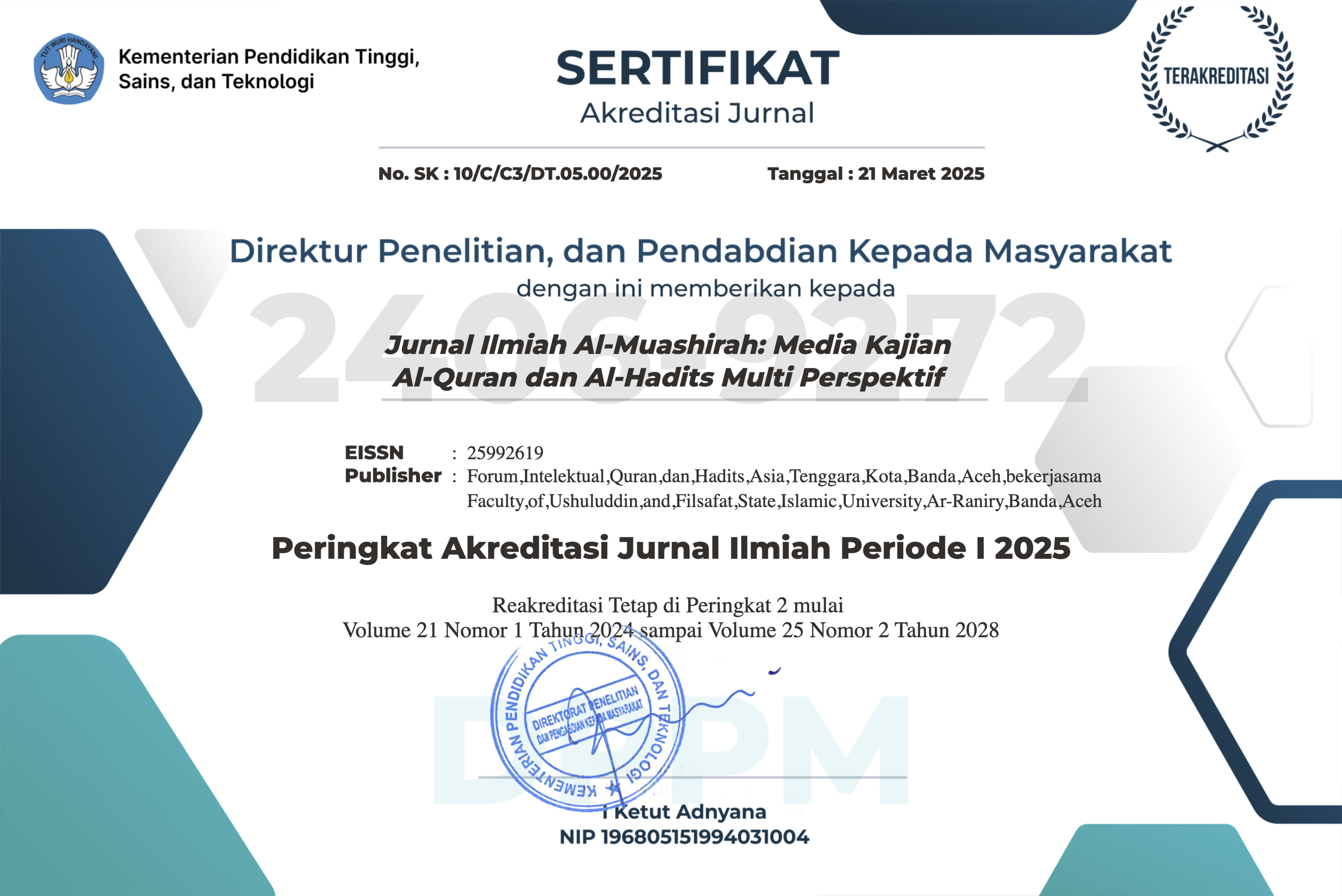Variety of Expressions of Arrogance in The Qur’an
DOI:
https://doi.org/10.22373/jim.v20i1.16434Keywords:
Arrogant, Takabburan, Marahan, 'Uluwwan, 'Utuwwan, Ashiru, Jabbāran, MukhtālanAbstract
The problem in this paper is the number of expressions used by the Qur'an to refer to the word arrogant, namely takabburan, marahan, 'uluwwan, 'utuwwan, ashiru, jabbāran, and mukhtālan, which are different expressions in terms of words but have the same meaning, namely arrogance. This raises the question, "What is the difference between these different expressions?" The discussion in this paper employs the tafsir mawdhu'i method, with library research, to collect verses of the Qur'an that have the same meaning in the sense that they both discuss one topic of the problem. The data used are verses of the Qur'an, books of Tafsir, the Arabic Dictionary, Mu'jam, and secondary sources in the form of books by several scholars. Furthermore, the author provides information and explanations before concluding. The results of the study of the words are that the six words in question have meanings that are almost the same as one another but with different contexts and purposes. Takabburan is the arrogance of man towards Allah by not believing and bowing down to Allah. 'Uluwwan is the arrogance of man on earth, manifested by committing injustice. 'Marahan is being arrogant while walking, or walking with pride. The word mukhtālan is the same as delusion, the feeling that one has advantages (such as wealth) over others, turning one's face and cheeks away when talking to others. The word jabbāran refers to being proud of one's parents and not being devoted to them. The phrase takabburān occurs 48 times, the phrase 'uluwwan occurs 8 times, the phrase jabbāran occurs 3 times, the phrase mukhtālan occurs 3 times, the phrase marahan occurs 2 times, and the phrase asyiru occurs 2 times.
Downloads
References
Al-Alawi al-Baghdadi, Sayyid Mahmud, Tafsir Ruhul Ma’ani (lebanon: Lidarul Qutub al-‘Ilmiyah, 1993)
Al-Ashfahani, Ar-Raghib, Al-Mufradat Fi Gharibil Quran (Jawa Barat: Pustaka Khazanah Fawa’id, 2017)
al-Marāgi, Musṭafā Ahmad, Tafsir Marāgi (Beirut: Dar al-Fikr, 1986)
al-Ṣabūnī, Ali Muhammad, Ṣafwat Al-Tafāsīr (Jakarta: Pustaka al-Kautsar, 2011)
Izutsu, Toshihiko, Konsep-Konsep Etika Religious Dalam Al-Quran (Yogyakarta, 1993)
Jalaluddin al-Mahally, Imam, Tafsir Jalalain, jilid 1, C (Bandung: Sinar Baru Algensindo, 2003)
Katsīr, Imam Ibnu, Tafsir Ibnu Katsīr (Jawa Tengah: Insan Kamil, 2016)
Ma’luf, Louis, Al-Munjīd Al-Wasit Fi Al-‘Arabiyah Al-Muh Asirah, Cet 1 (Beirut: Dar al-Masyriq, 2003)
Mandzur, Ibnu, Lisān Al-‘Arab (Beirut: Dar Shadr, 1967)
Muzakki, Ahmad, Statistika Al-Quran. Gaya Bahasa Al-Quran Dalam Konteks Komunikasi (Malang: UIN Malang, 2009)
Nawawi, Ismail, Risalah Pembersih Jiwa (Surabaya: Karya Agung, 2008)
Shihab, M. Quraish, Mukjizat Al-Qur’an (Bandung: Mizan, 2006)
———, Tafsir Al-Mishbah (Jakarta: Lentera Hati, 2010)
Utsman Najati, Muhammad, Psikologi Nabi (Bandung: Pustaka Hidayah, 2005)
Downloads
Published
Issue
Section
License
Authors who publish in Jurnal Ilmiah Al-Mu'ashirah agree to the following terms:
- Authors retain copyright and grant the journal right of first publication with the work simultaneously licensed under a Attribution-ShareAlike 4.0 International (CC BY-SA 4.0) License that allows others to share the work with an acknowledgment of the work's authorship and initial publication in this journal.
- Authors are able to enter into separate, additional contractual arrangements for the non-exclusive distribution of the journal's published version of the work (e.g., post it to an institutional repository or publish it in a book), with an acknowledgment of its initial publication in this journal.
- Authors are permitted and encouraged to post their work online (e.g., in institutional repositories or on their website) prior to and during the submission process, as it can lead to productive exchanges, as well as earlier and greater citation of published work (See The Effect of Open Access).













